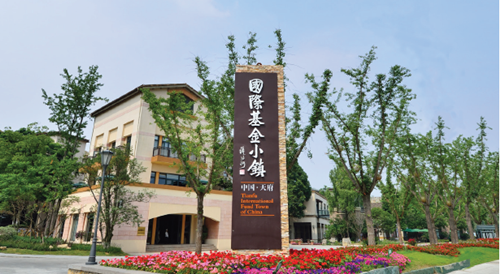Western China financial sector to deepen links with world markets

Tianfu International Fund Town of China in Chengdu, capital of Sichuan province, is one of the newly-established financial centers in the city.
A vital hub related to China's Belt and Road Initiative, Chengdu, capital of Sichuan province, aims to build itself into an international financial center by 2022 in the near future, according to industry insiders at a promotional event held last month in Hong Kong.
The event was part of a cooperation week between Sichuan province and Hong Kong. It focused on achieving mutual economic benefits between the Chinese mainland and Hong Kong — especially in the financial industry — and attracting more global investment and capital into western China.
"We are not only aiming to attract investment but also seek to build a platform for deeper cooperation," said Liang Qizhou, deputy director of the Chengdu finance office. He added that based on both sides' advantages, Chengdu is able to build a stable and long-term relationship with Hong Kong in the financial industry.
Sixteen projects were signed during the event, totaling $15.74 billion, among which three financial projects were each valued at $900 million.
The Chengdu government signed cooperation agreements with numerous financial institutions, including the Hong Kong Stock Exchange, China International Capital Corp, Bank of China (Hong Kong), ICBC Asia and Nanyang Commercial Bank.
In addition, State-owned enterprises in Chengdu have established business ties with renowned Hong Kong companies such as Credit, Hong Kong Tiansheng Securities, China Cinda Hong Kong Holdings and GF Holdings (Hong Kong).
James Lau, head of the Financial Services and the Treasury Bureau in Hong Kong, said that as an international financial center, Hong Kong is an ideal platform for financing Chengdu's enterprises.
"Chengdu is a key economic hub in China and has already built close relations with Hong Kong in many areas, such as trade, technological innovation, and arts and culture."
"Actually, many banks and financial institutions in Hong Kong have eyed the development potential of Sichuan province, basing their operations in Chengdu as the gateway for expanding the market in western China," Lau said.
He added that Chengdu should seize the new opportunities under the Belt and Road Initiative, such as boosting liquidity in the capital markets, strengthening ties with financial institutions in Hong Kong and building a better environment for the development of the financial industry.
Wu Ziheng, a general representative for Chinese mainland business at the Hong Kong Trade Development Council, said that Chengdu is developing at a fast pace not only in finance but also such areas as infrastructure and commerce.
"I hope that Chengdu can attract more and more enterprises from home and abroad, and take advantage of the aggregation effect. Hong Kong, as a bridge between Chengdu and the outside world, holds huge potential for the city's expansion."
Ba Shusong, chief Chinese economist at the Hong Kong Stock Exchange, said that Chengdu and Hong Kong are both economically flexible and good at seizing opportunities.
"The economic structure in Chengdu is vibrant, with many emerging industries. An important part of the nation’s Belt and Road Initiative, Chengdu should tap a new market in Hong Kong," Ba said.
GLOBAL CENTER
An action plan was unveiled during the event, outlining aims to build Chengdu into an international financial center by 2020, with the financial industry accounting for 15 percent of the city's GDP.
Liang of the Chengdu finance office said the government plans to launch a series of projects focusing on supporting layered capital markets, venture capital bases, financial technology incubators and reforming the supply side of financial services.
"Constructing a financial center in western China requires breakthroughs in several aspects: demonstration areas for financial initiatives, an influential wealth management base, regional capital markets and venture capital hubs," he said.
"We need to structure a complete industrial cluster for the financial industry and make efforts to boost fintech, consumer finance and rural finance."
In July 2015, Chengdu became the first city in China to comprehensively reform rural financial services under a pilot scheme initiated by the People’s Bank of China, the National Development and Reform Commission and the China Banking Regulatory Commission.
Liang said that by 2022, Chengdu is expected to build three to five influential financial institutions in the consumer finance sector and at least one leading enterprise in financial big data.
Chengdu has vowed to speed up its efforts to construct business districts and high-tech zones for financial headquarters and enterprises.
Recently, the city has released a variety of favorable policies related to industrial development, to attract more financial capital through funds and equity investments.
For newly established financial institutions in Chengdu, the government will award a cash bonus valued at 1 percent of the company’s registered capital, at a maximum of 400 million yuan($61.53 million).
This provides for a maximum of 100 million yuan for high-tech enterprises, key labs and platforms for technological innovation in the financial industry.
Official statistics show that by the end of June this year, the added value of Chengdu's financial industry reached 75.1 billion yuan.
The sector contributes 14 percent of the city’s economic growth, ranking it the highest among cities in central and western China.
The number of foreign institutions in Chengdu is also the largest in central and western China. Chengdu is named among China’s Central Cities.


